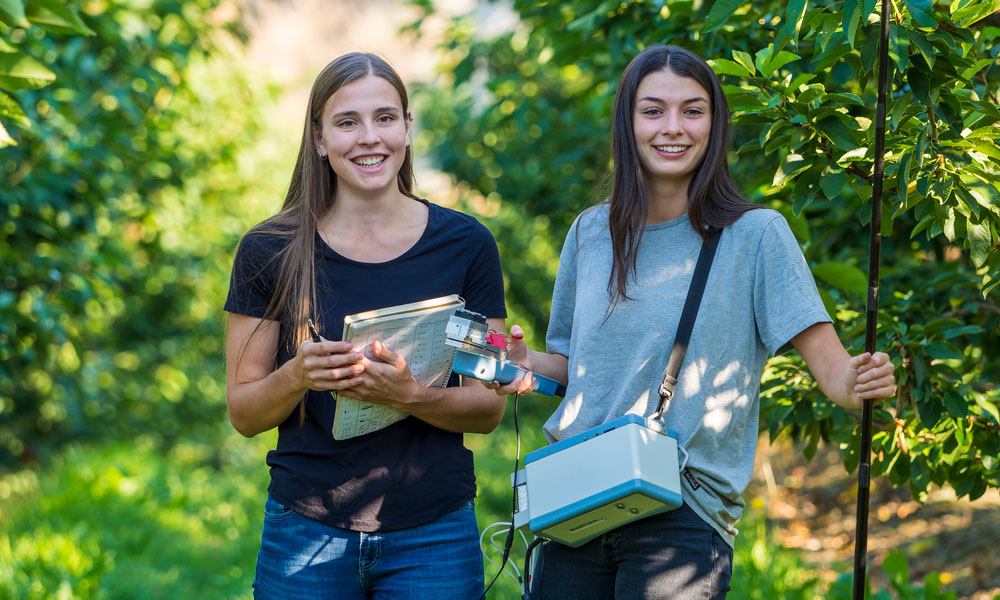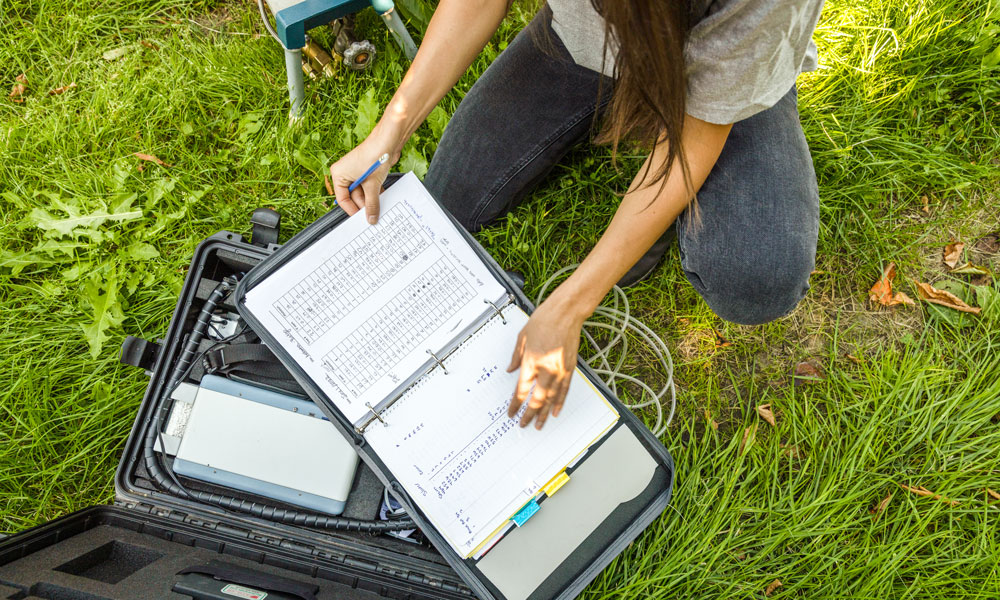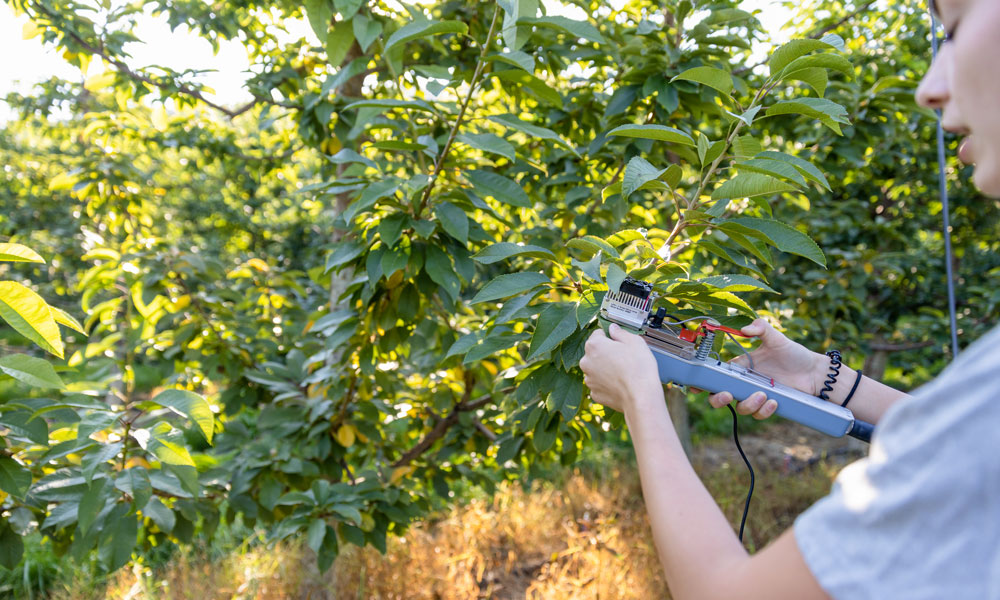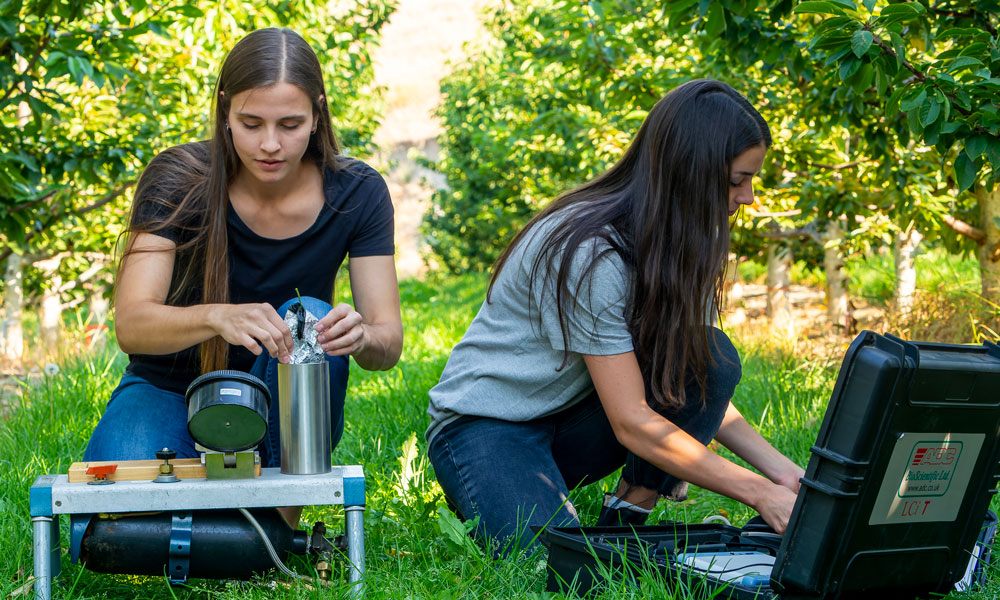
WHEN SHE STARTED HER FOURTH YEAR, Ava Bakala knew she wanted more experience—not only in her field of study, but with UBC Okanagan as a whole. Bakala searched for campus work opportunities on UBCO’s Student & Alumni Job Board, where she connected with the university’s Work Study program.
“To date, I primarily studied general biology, and I didn’t really have any tangible work experience related to my degree,” says Bakala. “When I first saw the Work Study posting, I wasn’t sure because the role focused on plant physiology and I didn’t think I had the necessary experience. But I was interviewed and eventually hired for the role.”
Bakala was thrilled to learn that she would be working as a Research Assistant exploring what happens to sweet cherries when irrigation is reduced after harvest—a critical question considering the dependence of agriculture on global water supplies.
Between May and August, Bakala and another student were responsible for collecting various measurements at five different orchards across the Okanagan Valley and inputting the massive amounts of data on open science platforms for graduate students to use. Bakala also spent considerable time in the lab, helping perform tests to determine things like firmness, colour and size of the cherries—all factors that could be affected when irrigation levels are altered. The project was supported by the Canadian Agricultural Partnership, a federal-provincial-territorial initiative, and delivered by the Investment Agriculture Foundation of BC.

Elizabeth Houghton (left) and Ava Bakala use several specialized tools in their research, including this photosynthesis meter, which measures net rates of photosynthesis.

Bakala notes several pieces of data, including the stem water potential of the cherries—or, how tightly the leaves hold on to water when put under pressure.

Here, the meter is fitted to a cherry tree leaf to measure gas exchange across the leaf section. This will indicate whether post-harvest water reductions have altered plant photosynthesis.

Houghton measures the leaf stem water potential in a pressure chamber. This measurement is an important indicator of tree water stress.
“My role was pretty independent and taught me a lot about communication and time management,” explains Bakala. “I had to learn how to manage my own deadlines alongside the project deadlines. I coordinated our research efforts between five different orchards and then shared this information with other team members, so everyone knew what was going on. It was definitely a lot of detail to manage.”
But perhaps the greatest benefit for Bakala of the Work Study role was its research focus: “I was able to broaden my overall knowledge of biology through the plant physiology work we did. The students involved in the project had a lab group and would get together to learn about each other’s projects.
“It was such a great learning experience; it opened me up to a whole new world that I didn’t know about before, and it also introduced me to what field research is like. I realize now that I really enjoy field research, and it opened my eyes to a master’s program, which I never considered.”
While many work study programs at universities across Canada and the US are geared toward providing financial aid to students, UBCO’s program has a more experiential twist, explains Jana Petrone, Director of Academic and Career Development at UBCO.
“We want to provide exceptional educational experiences to students that build career ready skills. Faculty and staff apply for funding in the program, and then we evaluate and fund the top-ranked opportunities for students. The goal is to help students shape their path forward, whether that’s gaining practical work experience with professors, staff and graduate students, refining their career aspirations, helping them to network or preparing for post-undergraduate studies.”
With an annual budget of more than $750,000, UBCO work experiences range from administrative roles to research positions, like the one Bakala applied for. Currently, more than half of Work Study funds go toward on-campus research annually, totalling 62 per cent of all funding in 2022.
“The Work Study program truly makes our research possible,” adds Elizabeth Houghton, a doctoral student who worked alongside Bakala on the sweet cherry fruit project. “We had five orchards that ranged in elevation and latitude, so there was lots of field and lab work that had to be done. Being able to have support from a Work Study student makes our jobs as researchers much more enjoyable.”
Houghton adds that such work study roles teach valuable skills that can often only be gained in the moment. “A huge skill associated with fieldwork is the ability to think critically on the fly—when things are going awry and not as expected. It’s great for these students to be put in the situation where they need to make a decision with the information at hand.”
As for Bakala, she says she achieved her goal of gaining more experience at UBCO. “The Work Study went above and beyond what I expected. I was able to make connections at the university and gain experience in research. I think a lot of students shy away from applying for these roles because they think they’re not qualified enough and won’t get an interview. I certainly thought that when I applied. But you just have to step out of your comfort zone. You won’t regret the experience you gain.”


